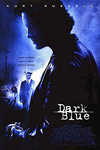Dark Blue (R) ★★½
 A rookie LAPD cop investigating a high-profile quadruple homicide learns the grim realities of police intimidation and corruption.
A rookie LAPD cop investigating a high-profile quadruple homicide learns the grim realities of police intimidation and corruption.
Story
In March 1991, TV stations repeatedly broadcast an amateur videotape of LAPD officers kicking and clubbing Rodney King, an unarmed black man. A year later, an all-white jury acquitted three officers involved in the beating, inciting a riot that killed 54 people and destroyed much of South Central Los Angeles. Dark Blue is a gritty police drama that unfolds in the four days leading up to the verdict. The story revolves around veteran cop Eldon Perry Jr. (Kurt Russell), who does what he needs to do to bring someone to justice, even if it means planting a gun--or drugs--on a suspect. But police intimidation and corruption doesn't sit right with his rookie partner Bobby Keough (Scott Speedman). Their ideologies clash when the two are assigned to a high-profile quadruple homicide and receive orders from a high-ranking member of the LAPD to pin the crime on innocent suspects in order to appease the public. Keough contemplates going to Deputy Chief Arthur Holland (Ving Rhames), the only black man in the department, about unfair police practices but is worried about going up against such a tight brotherhood. This cop flick is disturbingly realistic--which unfortunately is also its weakness. It tells us what we already know: that the history of the LAPD is meshed tightly with racism and corruption.
Acting
Dark Blue's Perry is a vulgar, hard-drinking and unscrupulous cop--and Russell (3,000 Miles to Graceland) does a great job embodying the character. He swears, knocks back drinks and smokes cigarettes like he's been doing this since birth. In fact, Russell creates such a despicable character that I hoped he would get his ass kicked by rioters. As his naïve partner Keough, Speedman (Duets) is a little bland. Keough redeems himself by rising above the police department's practices, but Speedman's character is almost too nice and fresh-faced to be a cop in a city like L.A. As Deputy Chief Holland, Rhames (Undisputed) is well cast but unfortunately the character is so one-dimensional that he doesn't make for a very passionate hero. The problem here is not the acting but the film's characters, which are too simply drawn. Keough, for example, is not only unprejudiced, he's politically correct--he has a black girlfriend and gets offended when his big, bad partner uses the ''n'' word. And Holland is not only honorable, he's a churchgoing community leader. It's not that these characteristics are bad, but they are certainly tautological and stereotypical by movie standards.
Direction
If this movie sounds a lot like Training Day, it's because scribe David Ayer wrote both of them. Unfortunately Dark Blue's characters are drawn with such a heavy hand they reek of clichés and are a far cry from Denzel Washington and Ethan Hawke's complicated and well-developed characters in Training Day. Director Ron Shelton found success with the 1988 hit Bull Durham and--with the 1994 sports drama Cobb--proved that he could deliver character-driven movies that were well worth watching. Despite the rigid characters, he manages to deliver a straight-up, dirty-cop movie that effectively mirrors the LAPD. (Is Holland, for example, the film's take on former LAPD Chief of Police Bernard Parks?) Shelton achieves the film's true-to-life feel by leaving out slick car chases, explosions and shootouts and paying closer attention to sets, such as Perry's unadorned house and the clunker he drives. There are some great scenes towards the end of the film when Perry is driving through South Central as the riots--which caused an estimated $900 million in damages--break out. What's even more chilling, however, is the lack of LAPD presence at the riot epicenter.
Bottom Line
Dark Blue is definitely a gripping and realistic film, but it fails to dig deeper and explore the reasons behind the LAPD's actions than the Christopher Commission already did in the aftermath of the Rodney King beating and the L.A. riots.
To get the full Quicklook Films experience, uncheck "Enable on this Site" from Adblock Plus
box office top 10

Civil War Released: April 12, 2024 Cast: Kirsten Dunst, Wagner Moura 11.1M

Abigail Released: April 19, 2024 Cast: Melissa Barrera, Dan Stevens 10.2M

Godzilla x Kong: The New Empire Released: March 29, 2024 Cast: Rebecca Hall, Brian Tyree Henry 9.5M

The Ministry of Ungentlemanly Warfare Released: April 19, 2024 Cast: Henry Cavill, Eiza Gonzalez 9M

Spy x Family Code: White Released: April 19, 2024 Cast: Takuya Eguchi, Saori Hayami 4.9M

Kung Fu Panda 4 Released: March 8, 2024 Cast: Jack Black, Viola Davis 4.6M

Ghostbusters: Frozen Empire Released: March 22, 2024 Cast: Paul Rudd, Carrie Coon 4.4M

Dune: Part Two Released: March 1, 2024 Cast: Timothée Chalamet, Rebecca Ferguson 2.9M

Monkey Man Released: April 5, 2024 Cast: Dev Patel, Sikandar Kher 2.2M

The First Omen Released: April 5, 2024 Cast: Nell Tiger Free, Bill Nighy 1.7M






